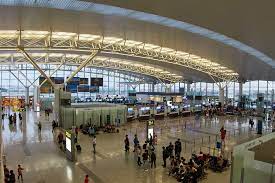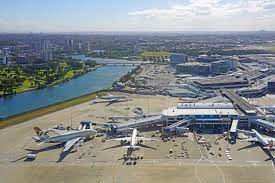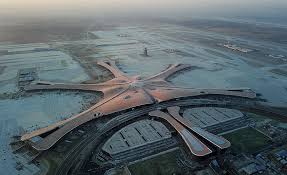A lot of people wonder about what makes an airport international . International airports play an essential part in global trade and economic expansion. Serving as gateways into different nations, international airports connect people from diverse parts of the globe with businesses across diverse geographies.
This article investigates the significance of international airports to global travel and the economy, while providing an overview of their history, evolution, significance in aviation industry and challenges they face. Furthermore, key features and services offered by these airports such as immigration/customs facilities/security measures/commercial activities/air traffic control systems as well as future trends/developments will also be covered herein; for example: adoption of new technologies/environmentally friendly aviation can all be explored herein. What is domestic vs International plane size comparison? Or, what is an international flight meaning? What is domestic airport? We are going to answer all these questions in this article.
Definition of International Airport

An international airport differs from domestic ones in many ways, including features and services like customs and immigration checkpoints, duty-free shops, currency exchange booths and international lounges. They typically also boast longer runways and larger parking areas to accommodate long-haul planes commonly utilized on international routes.
International airports typically implement more stringent security measures, including passenger and baggage screening as well as restrictions on what items can be brought onto an aircraft. They also often mandate compliance with international safety standards that may involve training and certification programs for pilots and crew members.
Overall, an international airport differs from domestic ones in its capacity to support international travel with services and facilities necessary.
Characteristics of an International Airport
International airports possess distinctive traits that set them apart from domestic ones, serving the needs of international travellers with regards to customs and immigration procedures, facilities and services that specifically target them. In this section we’ll go through some key characteristics that distinguish international airports compared with domestic ones – customs protection procedures and border protection, international flights and terminals among them; understanding these features are vital both as passengers traveling internationally as well as for aviation industry employees involved with aviation operations.
Customs and Border Protection Services
Customs and Border Protection (CBP), is an internationally respected federal law enforcement agency charged with safeguarding US borders while controlling entry of goods and people into the country. CBP officers regularly patrol airports, seaports and land border crossings around the globe in order to enforce immigration and customs regulations and to monitor any possible disruption in import/export traffic flows.
CBP officers play an essential role in screening passengers and luggage to detect illegal goods and people entering the country illegally, enforce trade laws and collect duties and taxes on imported products. Compliance with immigration and customs clearance is integral to international travel; failure to adhere to its regulations could incur penalties such as fines or even imprisonment.
Customs and border protection play an integral part of international airports, ensuring the safe flow of goods and people across borders while complying with relevant regulations and laws.
International Flights

There are various kinds of international flights, such as non-stop, direct, and connecting. Non-stop flights operate between two cities without intermediate stops; direct flights may make one or more stops but do not require passengers to change aircraft; connecting flights require layover and aircraft changes with additional security and customs procedures before flying directly between destinations.
Overall, international flights play an essential role in global commerce and travel – connecting people from diverse national and cultural backgrounds.
International Terminal
An airport’s international terminal provides facilities and services specifically geared to international flights, such as customs and immigration checkpoints, language translation services and currency exchange booths to meet the needs of foreign visitors.
International terminals differ from domestic ones in that they contain distinct check-in counters, security checkpoints and baggage claim areas for international travel. Furthermore, separate gates and boarding areas for each flight operate concurrently within these terminals for optimal efficiency and secure travel experience for passengers. Their design also seeks to minimize wait times while optimizing passenger experience as much as possible.
Before international flights, you must always check travel regulations for your destination country. European Travel Information and Authorization System, or ETIAS, is the European Union’s new framework for European travel. It aims to enhance the Union’s security capabilities without compromising the smooth traveling experience.
Conclusion International terminals are essential components of international airports, providing infrastructure and services necessary for international travel and commerce.
International Airport Designations

- Primary international airports are the busiest and largest international airports in a country. They handle significant amounts of international traffic, have multiple runways, and are equipped with extensive infrastructure and services to cater to international travelers.
- Secondary international airports are smaller and less busy than primary international airports. They usually have fewer runways and handle a lower volume of international traffic. They may also have more limited infrastructure and services compared to primary international airports.
- Niche international airports serve a specific market or region and typically offer specialized services and facilities. Examples include airports that cater to low-cost carriers, private jets, or cargo airlines.
- Regional international airports serve a particular region and provide access to international travel for people living in smaller towns and cities. They typically have fewer runways and handle a lower volume of international traffic than primary international airports.
The significance of each designation is that it helps identify the size, capacity, and role of the airport in the aviation industry. This information is crucial for airlines, travelers, and other stakeholders in the aviation industry to plan routes, flights, and travel itineraries.
The Importance of International Airports
International airports play an essential part in the economic and social development of their host communities, providing economic stimulus through job creation, tourism development and job growth, with significant reverberations impacting nearby businesses and industries.
International airports serve an integral role in commerce and trade. By connecting countries, these international airports facilitate goods and service movement between businesses allowing access to new markets and customers as well as revenue opportunities in tourism industry.
As mentioned above, ETIAS is going to change the way people travel around the world. From November 2025 there will be certain ETIAS requirements for Canadian citizens as well. ETIAS authorization, which enables nationals of 58 countries worldwide, including Canada, will allow you to visit the EU/Schengen area.
International airports also make a tremendous economic contribution by creating jobs in sectors like hospitality, retail and transportation. Furthermore, airports stimulate development of infrastructure such as hotels, restaurants and transportation links in their local economies.
International airports bring many advantages to their surrounding communities, including new business districts being developed, increased tourism numbers and growth of hospitality industry. Furthermore, airports provide small and medium-sized enterprises (SMEs) accessing new markets which foster innovation and entrepreneurship – contributing significantly towards economic and social development overall. It would be impossible to overstate their importance as agents for economic and social progress.
Conclusion

The importance of international airports cannot be overstated. They provide access to new markets, promote tourism, and create jobs in surrounding communities. Overall, international airports are essential gateways to the world, connecting people, businesses, and cultures from different parts of the world, and facilitating global trade and economic growth. Hopefully we have answered your question about what makes an airport international.
Q&A
What constitutes an international airport?
An airport is considered international if it has the necessary facilities and infrastructure to handle flights to and from other countries. This typically includes customs and immigration checkpoints, specialized services and facilities for international travelers, and international flights that operate between different countries.
What makes something an international airport?
An airport becomes international when it meets certain criteria to handle international flights. This usually involves having the necessary infrastructure, services, and security measures in place to facilitate international travel. This can include customs and immigration checkpoints, international flights, and specialized facilities and services for international travelers.
What qualifies an airport as international?
An airport is qualified as international if it has the necessary facilities and infrastructure to handle international flights. This can include customs and immigration checkpoints, international flights that operate between different countries, and specialized services and facilities for international travelers.
How does an airport become international?
An airport becomes international when it receives approval from the relevant authorities to handle international flights. This typically involves meeting certain criteria, such as having the necessary infrastructure, services, and security measures in place to handle international travel. Once an airport has been designated as international, it can accommodate flights to and from other countries.
What makes an airport international to domestic?
The difference between an international airport and a domestic airport is their ability to handle international travel. Domestic airports primarily handle flights within a particular country, while international airports cater to flights to and from other countries. International airports have additional facilities and services, such as customs and immigration checkpoints, duty-free shops, and international lounges, which are not typically found in domestic airports.
What makes an airport international in Europe?
In Europe, an airport is considered international if it handles flights to and from other countries, regardless of its location. The European Union has specific regulations and guidelines for international airports, such as security measures and environmental standards. Additionally, airports in Europe must meet certain criteria to handle international travel, including having the necessary infrastructure, services, and security measures in place.
Difference between domestic and international airports?
The primary difference between a domestic and international airport is their ability to accommodate international travel. Domestic airports primarily handle flights within a particular country, while international airports cater to flights to and from other countries. International airports have additional facilities and services, such as customs and immigration checkpoints, duty-free shops, and international lounges, which are not typically found in domestic airports.
How many international airports in US?
The United States boasts a vast network of international airports, totaling more than 500 across the country. These airports play a pivotal role in facilitating global travel and connecting the United States with the rest of the world. From major hubs like John F. Kennedy International Airport in New York to regional gateways like Miami International Airport in Florida, these airports offer essential infrastructure and services for international travelers, ensuring convenient and efficient entry into the United States.
